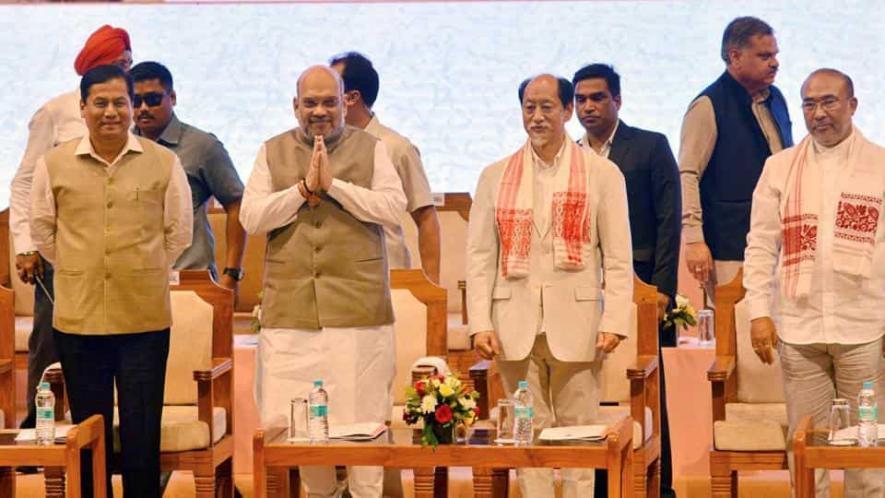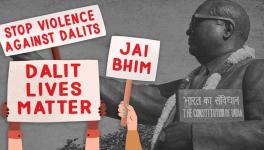Will the BJP forsake the Northeast to Win West Bengal in 2019?

Image for representational use only; Image courtesy : Hindustan Times/PTI
Making for a rocky start to the new year, the Joint Parliamentary Committee (JPC) on the Citizenship (Amendment) Bill, has rejected all the opposition’s amendments to it. The JPC report is likely to be submitted by January 7, before the Winter Session of Parliament concludes. Though this new development is in line with the Bharatiya Janata Party’s (BJP) Hindutva promises, it is likely to affect the saffron party’s electoral performance in the Northeast in general, and Assam in particular. However, this may not be the case in West Bengal where the BJP is hoping to make inroads.
The Citizenship Bill
The proposed Citizenship (Amendment) Bill, 2016, is an attempt to amend India’s citizenship law to ease the process of obtaining Indian citizenship on the basis of religion. The Bill relaxes the citizenship process for people coming from Afghanistan, Bangladesh and Pakistan, whether with valid documents or not. The only criteria is that the people must be Hindus, Sikhs, Buddhists, Jains, Parsis and Christians, since the Bill presumes that such people are ‘persecuted minorities’. Under the existing Citizenship Act, one can become a citizen by naturalisation provided one has resided in India consecutively for twelve years and that one is not an illegal immigrant. The amendment would allow the specified category of persons to become citizens after six years.
The opposition members in the JPC sought to remove religion as a determining factor as it violates the secular character of the Indian Constitution. However, the BJP members argued that the Bill pertains only to those who are persecuted and not to economic migrants. How this distinction can be determined is unknown.
Also See | Assam's LDM Protests Against Citizenship Amendment Bill at Jantar Mantar
Opposition to the Bill in the Northeast
The civilian opposition to the Bill is headed by student and youth organisations as well as civil society organisations. For most of 2018, around every sitting of Parliament, protests have been organised in various states in the Northeast. The Bill is being opposed in the Northeast as the people of the region believe that it will facilitate migration from Bangladesh. The fear of such migration is coming from the belief that it will result in a demographic change which relegates the locals to being unnecessary in electoral considerations.
Around the middle of 2018, the protests against the Bill reached such a fevered pitch that the JPC had to visit the Northeast and hold public meetings. At each stop, they were handed memorandums from various citizen forums. Predictably, the only place where there were memorandums in favour of the Bill was in the Barak Valley in Assam. This part of Assam is a predominantly Bengali speaking region.
Also Read | A Backdoor Push for the Citizenship Amendment Bill in Assam?
Citizenship and the Supreme Court
Issues of insiders and outsiders, citizens and non-citizens has dogged politics in the Northeast for years. Even in those states where the influence of armed politics is minimal if not non-existent, the issue still crops up from time to time. Arunachal Pradesh has from time to time seen the All Arunachal Pradesh Students’ Union (AAPSU) frisk ‘non-locals’ to check whether they possess an Inner Line Permit (ILP). Similar actions have occurred in Mizoram headed by the Mizo Zirlai Pawl (MZP) and other Mizo civilian organisations. In Sikkim, the laws around the Sikkim Subject Certificate (SSC) are guarded jealously and allegations of forged SSCs are often brought to the fore by disgruntled local organisations. Meghalaya and Manipur have had a number of unsuccessful attempts to implement some sort of an Inner Line System. However, the demand for such a system once again flows from guarding an in-group’s resources, whether political or otherwise.
In the context of Assam, which has seen the rise and decline of armed politics – the revival at present is possible – the civilian organisations have shifted from relying heavily on shutdowns and have instead moved the Supreme Court. In July 2005, current Chief Minister of Assam, Sarbananda Sonowal was victorious in his petition when the Supreme Court declared the Illegal Migrants (Determination by Tribunals) Act, 1983 (IMDT Act) to be unconstitutional. The IMDT Act was enacted solely for Assam and created a situation where the State had to prove whether someone is a foreigner or not. This was a departure from the Foreigners Act – which the rest of the country follows – where one is expected to prove one’s citizenship.
Also Read | Has BJP Really Won the Assam Panchayat Polls?
In July 2009, Assam Public Works – a social organisation – filed its petition to update the National Register of Citizens (NRC) in Assam. The Supreme Court monitored process began in 2015 and has come under attack from various quarters for alleged bias. On December 31, 2017, the first draft was published amidst speculations of widespread violence. Once again on July 30, when the final draft was published, the state was saturated with security forces on high alert. In both cases, the fears of violence were unfounded. Around 40 lakh people had been left out of the final draft. A tentative window of 60 days from September 25 was granted for people to file objections. The deadline was extended on November 1 to December 15, due to a controversy regarding five documents to prove citizenship. However, by November 19, only around 8 per cent of the 40 lakh people left out, had reapplied. The deadline was yet again extended to December 31, as the government had requested the Court for more time due to the panchayat elections in the state. At present, the figure has gone up to around 30 lakh applicants. The Hindu has reported that the deadline for processing the applications is June 2019, and the service centres will be open till the end of January for correcting names.
Also See | Citizenship (Amendment) Bill Will Destroy the Constitution: Suprakash Talukdar, CPI(M)
While the focus was on the NRC process, the BJP was preparing the groundwork for the Citizenship (Amendment) Bill. On September 7, 2015, two amendments were made to the Passport (Entry into India) Rules,1950, and the Foreigners Order, 1948. Both of these amendments effectively designated people coming from Afghanistan, Bangladesh and Pakistan as ‘refugees’ – provided that they were Hindus, Sikhs, Buddhists, Jains, Parsis or Christians – and relaxed the law regarding their entry and stay in India. These amendments passed by unnoticed whereas the Citizenship (Amendment) Bill received widespread opposition in the Northeast.
As mentioned by Rajeev Bhattacharya in The Wire, in 2016, the All Assam Students’ Union (AASU) challenged the amendments in the Supreme Court. However, the Court refused to admit their petition and they decided to file interlocutory applications to be impleaded in other similar matters. On December 21 last year, the Nagarikatwa Aain Songsudhan Birodhi Mancha (Forum Against the Citizenship Amendment Bill) headed by Dr. Hiren Gohain and former DIG of Assam, Harekrishna Deka challenged the amendments in the Supreme Court on the basis of secularism, indigenous rights and violating the principal legislations. Now adding to these petitions, seventy organisations led by Akhil Gogoi’s Krishak Mukti Sangram Samiti are preparing to petition the Supreme Court on the same matter.
Also Read |NRC: Only 8.75 Percent of Those Left Out have Filed Claims
Political Fallout
At the macro level of national politics, the BJP’s moves regarding citizenship offends the secular character of the Indian Constitution. This is a point that has been driven home by the opposition parties. It was also reiterated in the petition submitted before the Supreme Court in the Nagarikatwa Aain Songsudhan Birodhi Mancha’s petition. However, at a micro-level, the moves threaten the rather frail inter-ethnic equations in the region. In Assam, since October 2018, ‘Kashmir-style’ videos have been uploaded on Facebook by young men and women declaring their allegiance to the United Liberation Front of Assam (Independent) [ULFA(I)]. In each case the people in the video cited the Citizenship Bill as the motivating factor.
Also Read | Will Assam Burn While BJP Fiddles With the Citizenship Bill?
Considering that the Bill has come back at the fag-end of the BJP government, it’s existence in the Lok Sabha may be solely with an eye on the upcoming general elections. However, it is clear from the example of Assam, that whether the Bill is passed or not, it will be too dangerous to re-elect the BJP. Similar calculations may arise in other states in the Northeast. Thus, one may presume that the Bill will negatively impact the saffron party’s prospects in the Northeast.
However, the current aggressive push may be aimed more towards West Bengal, where the BJP has been a relative non-entity. Considering the disparity in parliamentary constituencies – West Bengal has 42 and the Northeast in total has 25, the trade-off makes for good political arithmetic. However, this may also affect the BJP’s prospects in the respective states where the BJP is a junior partner in a coalition or does not hold a clear majority.
Get the latest reports & analysis with people's perspective on Protests, movements & deep analytical videos, discussions of the current affairs in your Telegram app. Subscribe to NewsClick's Telegram channel & get Real-Time updates on stories, as they get published on our website.
























